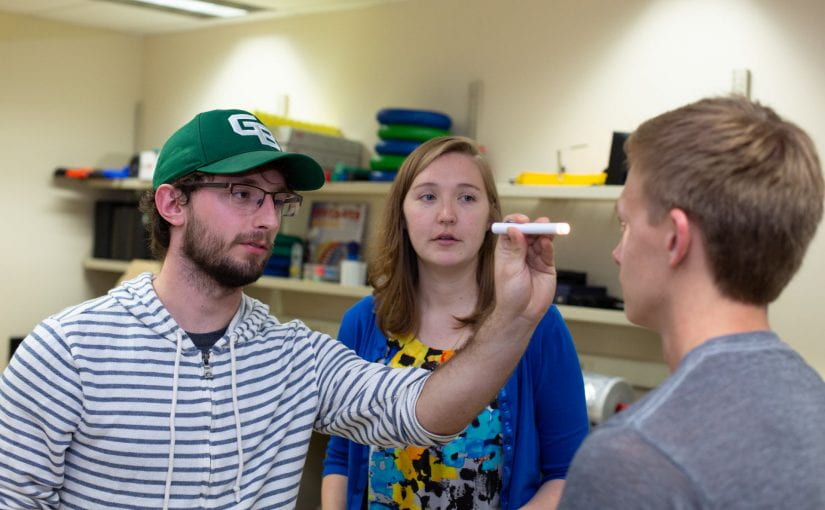Although the University of Wisconsin-Green Bay’s master’s degree in athletic training (MAT) is only in its fourth year, the program is already involved in cutting-edge research.
UW-Green Bay, along with West Point Military Academy and Children’s Hospital of Philadelphia, is part of a U.S. Department of Defense research project studying Oculogica’s EyeBOX novel algorithm and how it could be used in a portable device to assess concussions in deployed field and far-forward settings.
Oculogica is partnering with AdHawk Microsystems, which uses very small, ultra-low powered scanners and sensors that can be embedded in eyeglasses or a helmet, on the prototype. EyeBOX, is the first and only baseline-free, non-invasive device with FDA clearance to diagnose concussions.
TitletownTech, a venture capital fund led by the Green Bay Packers and Microsoft, invested in Oculogica, which now has an office in Green Bay.

That local connection caught the eye of Sadie Buboltz-Dubs, coordinator of clinical education in the master of athletic training program at UW-Green Bay. She reached out to Oculogica CEO Dr. Rosina Samadani saying the university’s MAT program would be interested in serving as a research partner. From there, the two kept in close contact.
Concussion research and its impact on the brain has grown in the past decade as more is learned about the long-term damage concussions can cause. While there are tests to look for concussions using neurocognitive function and balance, Bubolz-Dubs said EyeBOX is the first eye tracking device that can diagnose a concussion without clinician scoring.
“Concussion research is a booming area with many different well-known researchers. To be able to get our foot in the door in this arena is a big deal for our small institution, and our new program,” she said.
UW-Green Bay will field test the prototype and pilot its use during the 2022-2023 academic year with collegiate varsity teams. In Green Bay, athletes from St. Norbert College’s football and ice hockey programs will participate since the university does not have those sports, said Dr. William Gear, UW-Green Bay’s MAT program director.
“Those are two sports with a higher incidence of concussion so we were given those to study,” he said, adding the study goes through December 2023.
Bubolz-Dubs is excited about students taking part in the research. She already hired a full-time graduate research assistant and plans to hire part-time graduate research assistants to help with data collection. Getting involved with research provides students with valuable experience that can help them learn about different career pathways after they receive their master’s degree, she said.
“Research encourages organizational skills, teamwork skills, time management skills and gives students an opportunity to learn about a specific topic they may be interested in, but want to learn more about the topic that they may not be learning in class,” Bubolz-Dubs said.
Roger Wareham, director of the office of grants and research, said participating in the Oculogica study raises the university’s research profile.
“Among many things, this research helps contribute to new knowledge, provides opportunities for students to work with faculty researchers and external collaborators, and helps show the broad depth of research being done by UW-Green Bay researchers,” he said. “External research projects enhance the educational experience in many different ways.”
